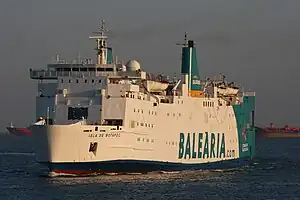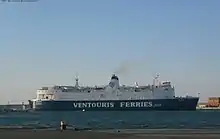 Bari as Isla de Botafoc | |
| History | |
|---|---|
| Name |
|
| Operator |
|
| Port of registry | Limassol, |
| Builder | Harland & Wolff, Belfast |
| Yard number | 1715 |
| Launched | 5 December 1979[2] |
| Christened | 4 December 1979[2] |
| Completed | 1980 |
| Maiden voyage | 27 October 1980[3] |
| In service | 1980 |
| Out of service | 2021 |
| Identification | IMO number: 7813937[1] |
| Fate | Scrapped |
| General characteristics | |
| Tonnage | 12,705 gross register tons (GRT) |
| Length | 129.65 m (425.4 ft)[1] |
| Beam | 21.62 m (70.9 ft)[1] |
| Draught | 4.84 m (15.9 ft)[1] |
| Propulsion | 2xPielstick 16PC2[1] |
| Speed | 18 kn (33.3 km/h)[1] |
| Capacity | 1,125 passengers[1] |

The MS Bari was a ferry built in 1980 as the St Anselm[4] for Sealink. Starting life on the Dover-Calais, she operated with Ventouris Ferries in her last routes in the Mediterranean.
Sealink
MS Bari started life as the St Anselm, order by and for Sealink services in the English Channel.[3] She was launched at the Harland & Wolff shipyard in Belfast[3] on 5 December 1979 and completed her maiden voyage on 27 October 1980.[3]
After two years in service, on 31 December 1982,[3] the St Anselm returned to Belfast for a £750,000 extension to her aft decks.[3] This extension provided an enlarged duty-free shopping area and additional accommodation, increasing her tonnage by 402 GT to 7,405 GT and her passenger capacity to 1,400.[3] On 28 March 1983 during her trip back to Dover through the Irish Sea, the St Anselm was temporarily brought into service on the Fishguard-Rosslare route following the failure of Stena Normandica's engines.[3]
In 1990, the St Anselm was displaced from the Dover-Calais route by Sealink's acquisition of the Fantasia, the St Anselm instead took up a service operating between Folkestone and Boulogne.[3] Not long after this transition, Sealink was acquired by Stena Line, in 1991 the St Anselm was transferred to Holyhead,[3] being renamed the Stena Cambria as a refit relief during February and March,[3] briefly returning to Dover before resuming service in the Irish Sea in July that same year.[3]
Stena Line
In July 1995, SNAT announced they would be terminating the pooling agreement that had been in place with Stena Sealink Line, which as a result, dropped the "Sealink" name, becoming just Stena Line. As a result of the loss of the two French vessels, Stena Line transferred the Stena Cambria and the Stena Empereur back to the Dover-Calais route for the 1996 season.[5] In March 1997 she provided refit relief in Stranraer and on 3 May 1997 became the last conventional ferry to sail out of Dun Laoghaire to Holyhead having provided overhaul relief for the Stena Explorer.[3] In March 1998 she transferred to the Newhaven-Dieppe route under the newly formed P&O Stena Line, staying there until the routes withdrawal in January 1999.[5]
Post P&O Stena Line
Following the routes withdrawal in January 1999, the Stena Cambria was laid up in Zeebrugge awaiting sale,[5] eventually being purchased by UMAFISA, entering service for them between Barcelona and Ibiza that November[5] as the Isla de Botafoc. In August 2003, UMAFISA and the Isla de Botafoc were acquired by rivals, Balearia.[5] She continued services with Balearia to Ibiza and Menorca[5] until her eventual sale to Ventouris Ferries of Greece in 2010, briefly being renamed Winner 9 and then to the Bari.[1]
Sister ships
MS Bari has three sister ships;
- Stena Caledonia
- Stena Antrim
- Stena Galloway
References
Notes
- 1 2 3 4 5 6 7 8 9 10 11 "M/F Bari". Ferry-site.dk. Retrieved 28 June 2010.
- 1 2 "MS Stena Cambria Part One". HHVFerry.com. Retrieved 28 June 2010.
- 1 2 3 4 5 6 7 8 9 10 11 12 13 "Stena Cambria". Sealink-Holyhead.com. Retrieved 28 June 2010.
- ↑ "Stena Cambria". SimplonPC.co.uk. Retrieved 28 June 2010.
- 1 2 3 4 5 6 "MS Stena Cambria Part Two". HHVFerry.com. Retrieved 28 June 2010.
Bibliography
- Cowsill, Miles; Hendy, John (2006). The Saints go marching on: British Rail's Last Cross-Channel Ferries. Kilgetty, Pembrokeshire: Ferry Publications. ISBN 187194774X.
